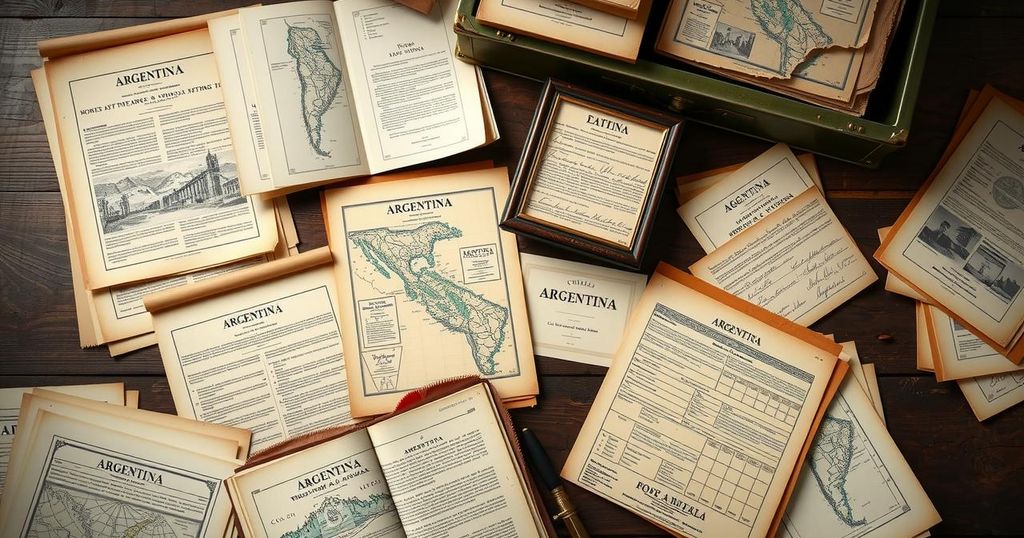Elections
Politics
ARGENTINA, BUENOS AIRES TIMES, CIA, CLIMATE CRISIS, COLOMBIA, CREDIT SUISSE, CUBA, GRASS, GRASSLEY, HISTORY, IOWA, JOSEF MENGELE, NATIONAL SECURITY, NAZI PARTY, NORTH AMERICA, PHILLIP CITROEN, POLITICS, SENATE JUDICIARY COMMITTEE, SOUTH AMERICA, TRUMP ADMINISTRATION, U. S, WORLD NEWS
Clara Montgomery
Argentina to Declassify Secret Files on Nazi Fugitives After WWII
Argentina is set to declassify government files on Nazi fugitives who fled after World War II, including bank accounts and escape route records. The initiative follows a request from U.S. Senate Chairman Chuck Grassley to investigate Nazi-related accounts at Credit Suisse. Notably, figures like Adolf Eichmann and Josef Mengele found refuge in Argentina after the war. The released documents may enhance understanding of the operations aiding their escape.
The Argentine government is preparing to declassify documents related to Nazi fugitives who settled in the country following World War II. Reports suggest these files will encompass accounts linked to Nazis, along with records detailing the escape routes known as “ratlines,” used by these individuals to evade justice after the war.
Interior Minister Guillermo Alberto Francos announced this significant development, as noted in the Buenos Aires Times. It is estimated that around 10,000 Nazis and fascist war criminals found refuge in Argentina and other Latin American nations, including prominent figures like Adolf Eichmann and Josef Mengele.
The release of these documents follows a request from Senate Judiciary Committee Chairman Chuck Grassley, who has been investigating Nazi-associated bank accounts potentially linked to Credit Suisse. Grassley emphasized that access to these records could reveal crucial insights into the covert arrangements facilitating Nazi escapes.
Argentinian President Javier Milei assured representatives from the Simon Wiesenthal Center of his complete cooperation in disclosing the documents. The center is renowned for its efforts in tracking down former Nazis and is named after a noted individual in this pursuit.
In 2017, the CIA declassified a document investigating Adolf Hitler’s potential survival in South America well after the war’s conclusion. This document references a former SS soldier claiming to have met Hitler in Colombia during the 1950s. However, historians assert that Hitler died by suicide in 1945, and his death was officially recognized years later.
Eichmann, one of the key architects of the Holocaust, was captured in Argentina in 1960 by Israeli agents and subsequently executed. Mengele, known for his inhumane medical experiments, fled to Argentina in 1949, lived there for a decade, and eventually died in Brazil in 1979.
Documents from 2020 indicated that over 12,000 Nazis lived in Argentina during the 1930s and possessed bank accounts at what is now Credit Suisse, with these files discovered at a former Nazi headquarters in Buenos Aires.
Argentina’s forthcoming document release could provide insight into the historical context of Nazi movements post-World War II, deepening the understanding of this challenging chapter in history.
The impending declassification of Argentine documents concerning Nazi fugitives represents a significant step in uncovering the historical paths taken by war criminals after World War II. With an estimated 10,000 Nazis finding asylum in Argentina, including key perpetrators like Eichmann and Mengele, these records promise to illuminate long-concealed networks and escape tactics. Continued investigations into these matters remain critical as society seeks to confront the horrors of the past and discourage the resurgence of antisemitism.
Original Source: wfin.com








Post Comment